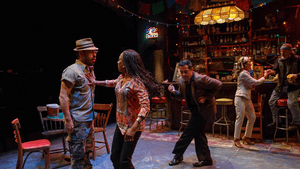Stay in the Loop
BSR publishes on a weekly schedule, with an email newsletter every Wednesday and Thursday morning. There’s no paywall, and subscribing is always free.
Empathy, Philly style
Quiara Alegría Hudes's 'Daphne's Dive' at Signature Theatre

The neighborhood bar, as a colorful setting, has sparked the dramatic imagination of numerous native Philadelphian writers. A club that once stood at the corner of 15th and Bainbridge inspired Lanie Robertson to write Lady Day at the Emerson Bar & Grille, where the legendary Billie Holliday, high on heroin, performed during the last years of her life. (Audra McDonald recently immortalized the show on Broadway.) Local playwright Bruce Graham set his Early One Evening at the Rainbow Bar & Grille in a taproom based on “Patti’s Bar” in Indiana, Pennsylvania, located on Philadelphia Street.
And now, Philadelphia-born playwright Quiara Alegría Hudes invites us into a neighborhood bar in North Philly, where a coterie of colorful regulars — activists, artists, and friends — hang out, share the local news, and support each other through major life events.
Daphne’s Dive, as this heartfelt play is called, was inspired by a true incident, when the playwright’s older cousin discovered an abandoned child in an adjacent row home, took her in, and adopted her. In this dramatic reimagining of the event, Daphne (the bar’s Puerto Rican-American owner) takes in an 11-year-old African-American girl named Ruby (Samira Wiley), who becomes part of the bar’s extended multicultural family. That family includes Jenn (K.K. Moggie), an Asian-American activist; Acosta (Carlos Gomez), a businessman and candidate for City Council; Pablo (Matt Saldivar), an artist inspired by urban detritus; Daphne’s sister Inez (Daphne Rubin-Vega); and Rey (Gordon Joseph Weiss), Daphne’s only white regular, a motorcycle-riding glass worker.
The story follows Ruby’s maturation from age 11 to 29, as she and the other characters face numerous challenges. Among the women, there are shared revelations of abuse at the hands of fathers and husbands. There is conflict between Ruby and Daphne, as Ruby struggles to come to terms with the tragedy of her seminal family and her “survivor’s guilt” (her mother was imprisoned and her disabled brother placed in a foster home).
Crisis inside, crisis outside
These personal crises occur against a political backdrop of urban unrest, police brutality and violent political protest. (The play covers the period from1994 to 2011, and references many Philadelphia locales, including LOVE Park.)
What binds these characters together is a love of community, and a shared sense of compassion and responsibility for Ruby. These are characters who care deeply about one another, who look out for one another, and whose communal bond transcends individual preoccupations. “There’s stuff I want to forget,” Ruby tells Daphne, in one of their most painful shared moments. “Maybe we can forget together.”
Designers Donyale Werle (set) and Betsy Adams (lights) create a colorful setting in corridor configuration, inviting the audience into this tight community. Under the skilled direction of Thomas Kail (Hamilton), the spirited cast wins our hearts. Vanessa Aspillaga is an empathetic Daphne; Gomez and Rubin-Vega (of Rent fame) play their roles with style and flair. Wiley (Orange Is the New Black) is especially touching as Ruby, moving through adolescence, struggling to define herself.
Philly roots run deep
Daphne’s Dive pulsates with life, Philly flavor, and an authentic sense of community and caring. These appealing features run throughout this playwright’s impressive work. Born of a Puerto Rican mother and Jewish father, raised in West Philadelphia, Hudes acquired a social conscience from her family. Hudes’s mother worked for the American Friends Service Committee, a Quaker humanitarian organization, and co-founded Casa Comadre, a women’s resource center in North Philadelphia. Her aunt initiated a program wherein community residents could buy abandoned lots from the city and convert them into gardens. Keeping up the family tradition, Hudes herself worked as a peer educator while a student at Central High School.
Hudes’s Philadelphia roots run deep in her other plays as well, including her acclaimed “Elliot trilogy," in which an Iraqi War veteran returns home to the city to face the challenges of post-combat reality. The second part of the trilogy, Water by the Spoonful (set in various area locales) won the 2012 Pulitzer Prize for Drama. Hudes also brought her sense of extended community to collaborate with Lin-Manuel Miranda on the book of the musical In The Heights (also directed by Kail, about the Dominican-American neighborhood of Washington Heights).
Speaking of the true story behind Daphne’s Dive in the program notes, Hudes explains: “A jolt of empathy can jump adults’ hearts. The truth is, we’re hardened. We simply are, it’s a survival tactic. And then a jolt of empathy can remind us what matters.”
What, When, Where
Daphne’s Dive, by Quiara Alegría Hudes; Thomas Kail directed. Through June 12, 2016 at Pershing Square Signature Center, 480 West 42nd Street, New York. (212) 244-7529, or signaturetheatre.org.
Sign up for our newsletter
All of the week's new articles, all in one place. Sign up for the free weekly BSR newsletters, and don't miss a conversation.
